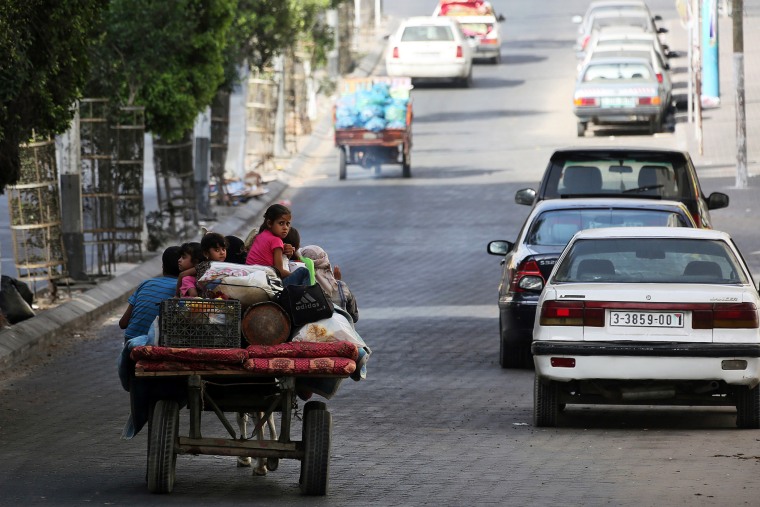Tensions between Israel and Hamas continued to escalate over the weekend, as airstrikes against Gaza entered into its sixth day with no signs that Palestinian rocket fire would soon abate.
On Sunday, Israeli forces were distributing leaflets in northern Gaza to warn civilian residents of the coming aerial bombardment.
"To the residents of Beit Lahiya,” read the leaflet from the Israel Defense Forces (IDF.) “The IDF intends to attack terrorists and terror infrastructures in the area east of Al-Atatra and Al-Salatin St., and in the area west and north of Ma'bscar Jabalyia. Israel is currently attacking, and will continue to attack, every area from which rockets are being launched at its territory. The civilians are requested to evacuate their residences immediately and move by 12:00 PM today, south of Jabalyia Al-Badr via Shar'a Al-Faluja.”
“The IDF's campaign is to be short and temporary,” the leaflet continued. “Those who fail to comply with the instructions will endanger their lives and the lives of their families. Beware."
Despite the warnings, Israel Radio reported that the Interior Ministry in Gaza, which is dominated by Hamas, told people to return to their homes, saying those who fled were helping the enemy.
At the start of his weekly Cabinet meeting Sunday, Israel Prime Minister Benjamin Netanyahu accused Hamas of using Gaza residents as “human shields.”
“For any attack on Gaza civilians, which we regret, Hamas and its partners bear sole responsibility,” he said.
Netanyahu later doubled down on this position during an appearance on Fox News Sunday.
“Here’s the difference between us,” he said. “We’re using missile defense to protect our civilians, and they’re using their civilians to protect their missiles.”
Sunday’s rocket exchange followed an overnight operation, in which Israeli forces targeted more than 20 terror sites along the Gaza Strip, according to an IDF press release. The mission marked the first time Israeli forces have acknowledged entering Gaza over the course of the current conflict.
According to the Health Ministry in Gaza, 171 Palestinians have been killed since hostilities intensified this month following the killing of three Israeli teenagers and one Palestinian teen. A further 1,100 have been wounded, according to Gaza Health Ministry, with 172 houses destroyed. Israel’s Mada reported that 16 have been wounded, including six soldiers and a teenager severely injured Sunday in Ashkelon.
More than 800 rockets have been fired from Gaza into Israel, the IDF said, and Israel has turned to its Iron Dome defense system to repel many of the attacks. Among its conditions for a cease-fire, Israel is demanding that Palestinians halt their rocket strikes and promise that a renewed deal lasts much longer than the last one, which was reached in 2012.
Hamas, by contrast, wants Israel to release dozens of prisoners arrested in the wake of the Israeli teenagers’ kidnapping and killing. The organization is also seeking money to pay its 40,000 employees in Gaza and the reopening of the Rafah crossing on its border with Egypt.
Western leaders are encouraging Egyptian President Abdel Fattah el-Sisi to help broker a deal between Israel and Hamas. But Sisi has not maintained as friendly a relationship with Hamas as have his predecessors, destroying over 1,000 smuggling tunnels under Egypt’s border with the Gaza Strip. According to the New York Times, a senior Hamas official said he had seen no “serious moves” from Egypt to push for a cease-fire.
The Obama administration has also offered to help cut a deal. According to a senior State Department official on Sunday, Secretary of State John Kerry and Netanyahu shared a phone call, during which Kerry condemned the rocket attacks from Gaza and stressed Israel's right to defend itself.
But Sen. John McCain scoffed at the U.S.’s brokering capabilities on Sunday, telling CNN’s Candy Crowley that "the United States’ influence has never been less than it is today."
"I would argue that given conditions in the Middle East, this might be more dangerous than any time in the past," said McCain.
